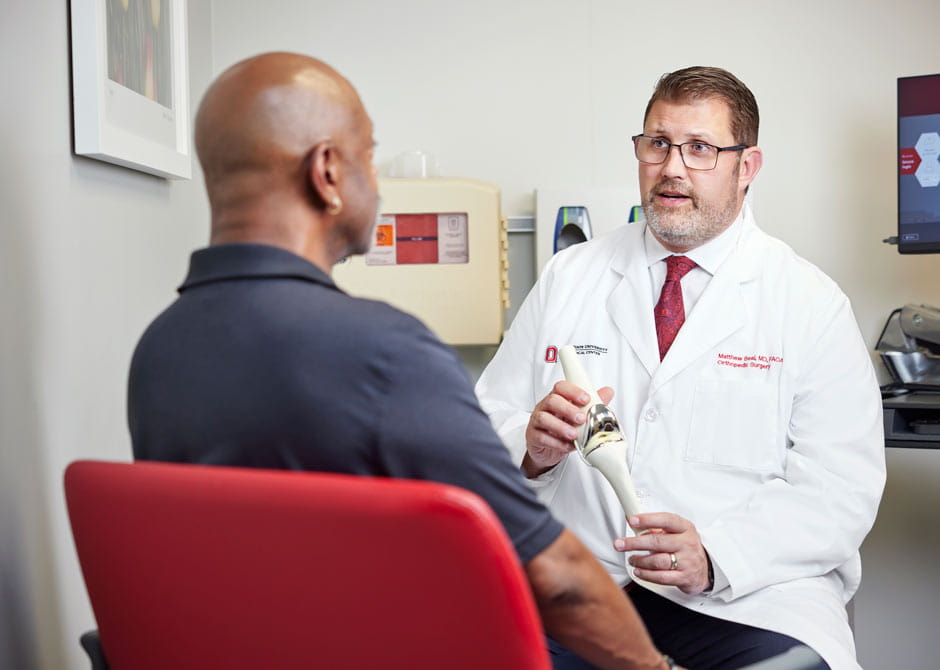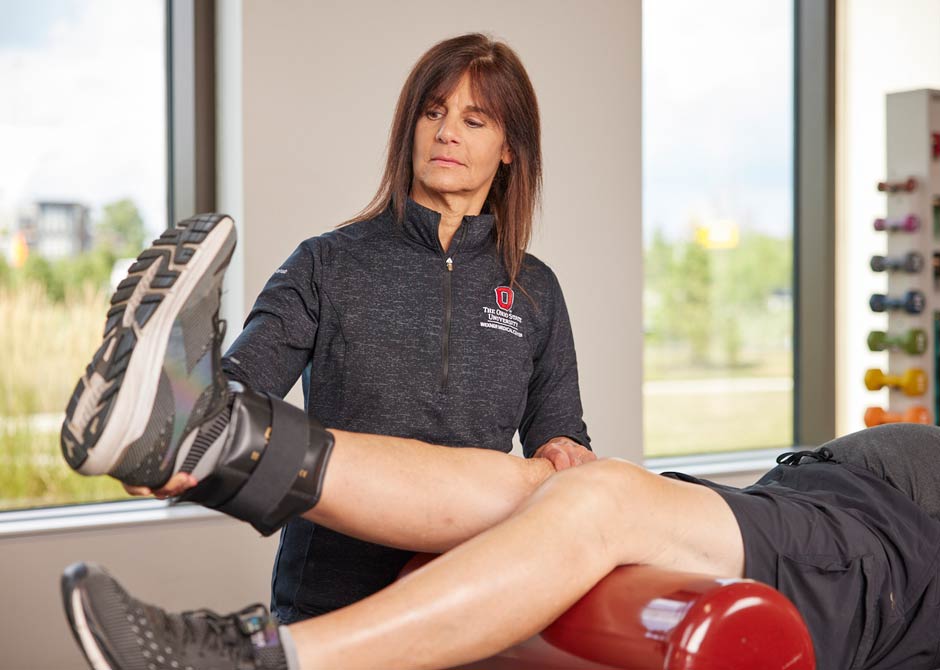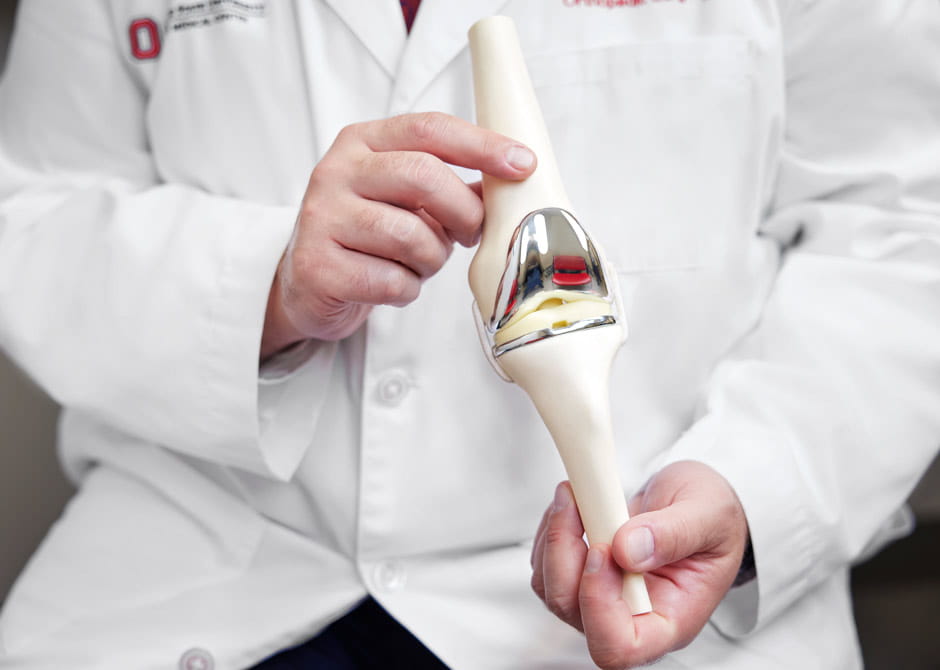 A knee replacement is an orthopedic procedure to relieve pain, stiffness or weakness in the knee joint and restore mobility.
A knee replacement is an orthopedic procedure to relieve pain, stiffness or weakness in the knee joint and restore mobility.
If you’re struggling to climb the stairs or walk your dog, it can have a tremendous impact on your quality of life. At The Ohio State University Wexner Medical Center in Columbus, Ohio, our joint replacement specialists understand how difficult it is to no longer be able to do activities that bring you joy or daily tasks necessary for your independence.
The orthopedic surgeons at the Ohio State Wexner Medical Center offer some of the best and most innovative joint replacement care in the region. If you’ve tried other nonsurgical treatments and they haven’t been effective, you might want to consider a knee replacement.
Whether you just started exploring your options for further knee pain treatment or you’ve already decided a knee replacement might be right for you, the knee replacement experts at Ohio State will help you get back to enjoying life.
What is a knee replacement?
A knee replacement, also called knee arthroplasty or orthopedic adult knee reconstruction, is a surgery to replace worn or damaged parts of the knee joint.
Your knee has three components: medial (inside), lateral (outside) and underneath the patella (kneecap). If one or more of these parts becomes diseased or damaged, it might need to be replaced with an artificial joint called an implant. The implant is typically made of metal and plastic. With partial knee replacement, your surgeon replaces only one part of your knee joint.
This surgery can relieve pain and improve movement in your knee joint, but knee replacement is only recommended when other nonsurgical options, such as injections or physical therapy, have not worked.
More than 700,000 total knee replacements are performed annually, and success rates are high.
What are the reasons for knee replacement surgery?
 The most common condition causing knee pain and immobility severe enough for knee replacement surgery is osteoarthritis, which is the breakdown of cartilage in the knee joint. Usually, this affects middle-aged and older adults.
The most common condition causing knee pain and immobility severe enough for knee replacement surgery is osteoarthritis, which is the breakdown of cartilage in the knee joint. Usually, this affects middle-aged and older adults.
Other conditions treated by a knee replacement include:
- Rheumatoid arthritis and other inflammatory disorders
- A fracture or other trauma that causes arthritis
When should I consider knee replacement?
Knee replacement surgery typically is not the first treatment method offered. We try other nonsurgical methods first.
You may need a total or partial knee replacement if:
- Less-invasive treatments, such as medicine, steroid injections, physical therapy or other joint preservation methods no longer stop your pain or help movement of the joint.
- Pain or poor movement in your knee prevents you from doing normal activities. For example, does your knee hurt constantly? Do you have difficulty getting in or out of a seated position? Does your knee ache even at night or while resting?
Understanding the difference: full vs. partial knee replacement
A full or total knee replacement replaces all three parts of the knee joint: the inside (medial), outside (lateral) and underneath the kneecap (anterior). When only one of these parts is damaged, we may recommend a partial knee replacement (unicompartmental arthroplasty), only inserting one artificial joint component.
While it may seem more appealing to have a partial surgery instead of a total knee replacement, it’s important to know that our knee replacement experts will choose the type of surgery that will give you the best outcomes. We’ll consider your age, condition, overall health, desired activity level and other factors when making this recommendation.
At the Ohio State Wexner Medical Center, the joint replacement experts offer types of knee reconstruction surgery not available elsewhere, such as knee preservation and minimally invasive procedures. The breadth of our knee replacement options is unmatched in the Columbus area.
Our leading-edge surgical knee reconstruction treatment options include:
- Tibial osteotomy, a non-replacement procedure that realigns the limb and preserves knee function
- Robotic-assisted surgeries, which is an innovative robotic partial and total knee replacement surgery that targets the specific diseased area and preserves bone, soft tissue and ligaments for more natural knee function post-surgery
- Knee arthroplasty, the surgical replacement of the surface of the knee joint to decrease pain and increase mobility
What to expect before, during and after knee replacement surgery
 While each person’s experience with knee replacement surgery will vary, here are some guidelines on what to expect.
While each person’s experience with knee replacement surgery will vary, here are some guidelines on what to expect.
Preparing for a knee replacement
Preparation before knee replacement surgery can help ensure you have a successful procedure and heal faster. Prior to surgery, you’ll meet with your physician to discuss your medical history, the medicines you take and any questions you have. Your physician may also schedule routine pre-surgical blood tests and imaging. You’ll be given instructions to follow before the surgery, such as fasting and when to stop taking medications you normally take. You must also take a free one-hour Buckeye Joint Class, either in person or online through MyChart.
Because the risk of infection could cause serious problems with your replaced knee, you need to have a dental clearance visit. If you don’t have a dentist, check with the surgeon’s office to see if they can help you find a dentist.
You may need some help to move around safely when you first leave the hospital after surgery. You’ll receive information on how to plan for help, prepare your home and buy adaptive equipment. Specific exercises will be recommended by your surgeon to strengthen your leg muscles before surgery.
During surgery
During surgery, you’ll most likely be under general anesthesia, meaning you’ll be asleep and unable to feel pain. Sometimes a spinal anesthetic is given. The surgery lasts roughly one to two hours. When you arrive at the hospital, here’s what will happen:
- An IV is inserted to administer the general anesthetics.
- The surgeon makes an incision to access the knee.
- The surgeon removes damaged cartilage surfaces and some underlying bone at the ends of the femur (thigh bone) and tibia (shin bone).
- Metal implants replace the removed surfaces to recreate the surface of the joint.
- The surgeon cuts the undersurface of the patella (kneecap) and smooths it out. This isn’t always done, depending on the surgery.
- Lastly, a plastic spacer is inserted between the artificial pieces to allow for a gliding surface.
- Once all the pieces are in place, the surgeon closes the incision, and you wake up in the recovery room.
Recovery after knee replacement
You’ll remain in the recovery room until you come out of general anesthesia. You will be on your feet, bearing weight the day of surgery. Some people are discharged the same day as surgery while others will go home the next day.
Each person’s recovery is different, and full return to normal activities will take a few months. Whether you go home or to a rehabilitation facility, such as Ohio State’s Dodd Rehabilitation Hospital, we’ll discuss your follow-up care, and a post-surgery visit will be scheduled. Your discharge instructions will include:
- Care for your incision and dressing
- Showering
- Medicines
- Exercises and therapy
- Any precautions you need to follow until your surgeon tells you otherwise
Most people who have this surgery will go directly to outpatient physical therapy within one or two weeks of surgery, but some utilize home-health physical therapy. You’ll participate in some form of therapy for about six to 12 weeks after surgery and expect to be off work for at least six weeks. Your exercises will be advanced as your new joint heals.
In addition to protecting your new knee joint with appropriate precautions provided by your surgeon, good nutrition and rest is essential to healing. It’s important to set realistic expectations for your recovery, knowing it takes time and that there are certain limitations to what the surgery can and cannot do.
What to expect and how to prepare for knee replacement surgery
Learn how to prepare for your knee replacement surgery at the Ohio State Wexner Medical Center.
Benefits of a knee replacement
Though full recovery from a knee replacement takes time and effort, there are advantages to having such a procedure. Most people who have a knee replacement have their pain significantly decreased or eliminated altogether. They also experience improved range of motion and strength, allowing them to participate in activities, such as walking, swimming, cycling, hiking and golf again.
Knee replacement risks
Complications from knee replacement surgery are rare, but occasionally they do occur. We take many precautions to try to prevent them.
Possible complications of a knee replacement include:
- Blood clots
- Infections
- Nerve damage
- Implant loosening or wearing down over time
- Reduced range of motion
- Failure to reduce pain or restore joint function

